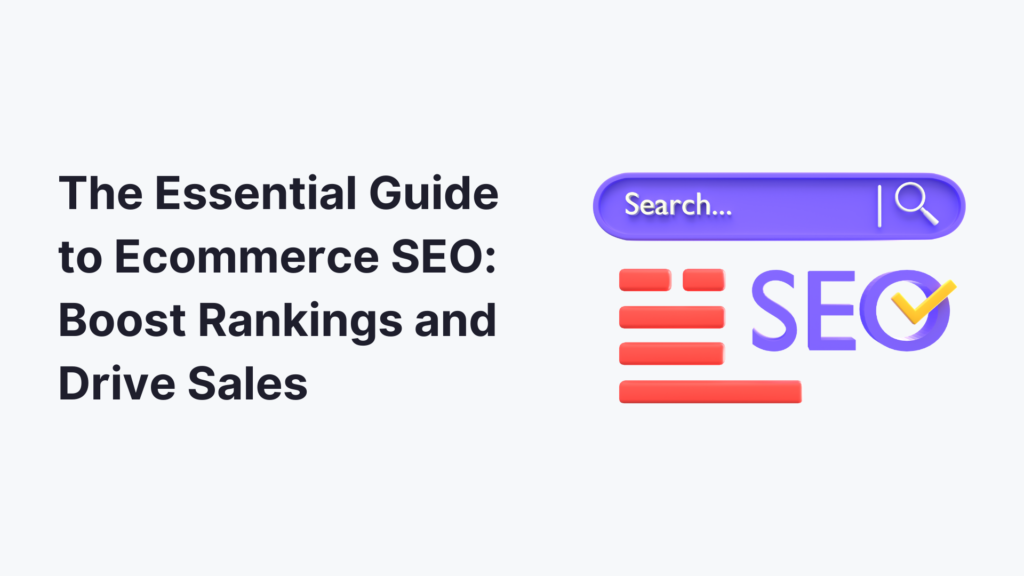The Essential Guide to Ecommerce SEO: Boost Rankings and Drive Sales

As competition in e-commerce increases, attaining top rankings in search engine results pages (SERPs) is essential to driving organic traffic and optimizing sales. Due to ever-evolving search algorithms and fierce online rivalry, understanding and implementing effective e-commerce SEO strategies becomes even more essential – this comprehensive guide seeks to demystify e-commerce SEO while offering actionable tips to boost rankings and ultimately sales growth.
Demystifying Ecommerce SEO
Basics of E-commerce SEO
It’s vital that you grasp its basics. Ecommerce SEO refers to optimizing techniques used to increase visibility and rank in search engine results pages of online stores – increasing exposure, targeting organic traffic sources, driving incremental sales increases.

importance of ecommerce seo
When it comes to e-commerce SEO, several key elements are necessary for success. One such element is optimizing product pages: by carefully tailoring titles, descriptions and meta tags of these product pages in response to potential customer search queries; optimizing images using descriptive alt tags can further ensure visibility within image search results.
At the core of any successful e-commerce SEO strategy is improving your site’s structure and usability, meaning creating an intuitive navigation system which enables visitors to find exactly what they’re searching for quickly and easily. By organizing products into relevant categories and subcategories, both search engines and visitors alike will find your products easier. Furthermore, making sure it loads fast while being mobile-friendly are essential factors in providing positive customer experiences while increasing search engine rankings.
Keyword research is also key for effective ecommerce SEO. By identifying which search terms your target audience uses when looking for similar products to those sold by you, you can tailor your website’s content so it corresponds with those search queries – this includes adding relevant words into product descriptions, blog posts, or any other form of writing on your site – without overstuffing with keyword-rich text that might negatively impact rankings. However, remember not to overdo keyword stuffing because this can have adverse repercussions for SEO rankings!
Building quality backlinks is another effective strategy for increasing e-commerce SEO. Backlinks are links from other websites pointing back to yours that serve as votes of confidence from search engines; by earning backlinks from relevant and credible websites, you can build up authority for your site while increasing search visibility in results pages. Various methods exist for accomplishing this; creating valuable content others want to link to or reaching out to influencers for collaborations may do the trick, as can guest blogging on other relevant blogs or sites.
Prioritizing page speed and mobile optimization are integral in today’s digital environment. Given that more users than ever rely on their phones for online shopping, fast websites must also accommodate this increasing trend; slow loading pages lead to high bounce rates and poor user experiences which in turn harm search engine rankings; thus optimizing performance by creating responsive sites across devices is vital for SEO success in e-commerce SEO.
Essential E-commerce SEO Practices for Success
Now that you understand the essential practices for successful e-commerce SEO, it is time to implement them to further boost rankings and sales.
One of the key steps in successfully SEO in any site is performing regular website audits to detect any technical issues that could thwart its SEO efforts, including broken links, duplicate content and crawl errors. By fixing these problems you ensure search engines can properly index and rank your site.
Optimizing the meta tags on your website is another essential practice, providing additional details and increasing organic traffic. Meta tags provide short snippets of HTML code which describe each web page accessed; by optimizing them (especially title tag and meta description tags), click-through rates increase as does organic traffic growth.
E-commerce SEO success requires producing quality and unique content of high-grade. By regularly publishing engaging blog posts, product guides, or any other forms of informative and entertaining media such as product videos or product photos on a topic of your industry or niche that establishes you as an authority and draws more organic traffic, producing shareable pieces can earn backlinks that boost website’s visibility as a whole.
Social media plays an essential role in e-commerce SEO. By actively engaging your target audience on platforms such as Facebook, Instagram and Twitter you can increase brand recognition, drive more visitors to your website and improve search engine rankings. Sharing content about products sold or encouraging user-generated posts are all ways that social media can assist your SEO strategy efforts.
Monitoring and assessing your website performance are the cornerstones of an effective e-commerce SEO strategy. With tools like Google Analytics, it is easy to track key metrics like organic traffic, conversion rates and bounce rates – providing invaluable insights into whether or not your SEO efforts have yielded fruit – so as to drive rankings up higher and increase sales.
Boost Your E-commerce Rankings with These Strategies
Prioritizing Page One: Strategies for Ranking Success
Ranking on the first page of SERPs is essential to driving organic traffic and maintaining competitive edge. To do this, prioritize optimizing technical elements, improving page load speed, and creating eye-catching meta titles and descriptions that compel clicks.

ecommerce seo
Conduct comprehensive keyword research to uncover high-opportunity terms aligning with user intent, then tailor content according. By truly comprehending who your target audience and their search queries are, creating relevant, engaging posts could increase chances of ranking on page one of search engine results pages.
Right Keywords for E-commerce SEO Is Essential
An effective keyword research strategy forms the cornerstone of successful eCommerce SEO. Begin by brainstorming potential keywords before exploring different keyword research tools in order to gain valuable insights.
Choose keywords with high search volumes and low competition; long-tail keywords tend to be ideal as they’re more specific and targeted allowing you to attract qualified traffic. Remember to integrate these keywords into product pages, category pages and blog content for maximum effect.
The Power of Blogging for E-commerce SEO
By publishing regularly high-quality, informative blog posts pertaining to your industry, blogging will expand keyword reach, generate backlinks, and increase organic traffic.
Guarantee that the content on your blog is well-researched, targeted at its intended target audience and optimized with keywords relevant to that group. Also encourage user participation through comments, social sharing buttons and an intuitive navigation experience, in order to keep visitors on your website longer.
Optimizing Your E-commerce Blog for Search Engines
Optimizing an e-commerce blog involves more than creating engaging posts; in order to maximize search engine visibility for the blog it is also vitally important that various on-page elements be optimized accordingly.
Consider including target keywords in blog post titles, headings, meta descriptions and image alt tags of blog posts to enhance SEO positioning of the entire website. Interlink your posts using pertinent anchor text that guides search engine crawlers and users throughout. A well optimized blog significantly strengthens its overall SEO standing.
Why E-commerce Site Structure is Important for SEO?
An intuitive website structure not only enhances user experience but also increases SEO visibility. Make sure your online store features a clear hierarchy with relevant categories and subcategories for optimal functionality.
Each category should be optimized with relevant keywords, while product pages should provide comprehensive product descriptions, images and customer reviews. Furthermore, breadcrumbs, XML sitemaps and user-friendly URLs should all help search engine bots quickly index your website.
Maximizing SEO Value with Internal Linking
Internal linking can be an underutilized SEO tactic with incredible potential. By linking pages within your website strategically, it will facilitate navigation, spread link authority evenly throughout, and boost keyword rankings.
When creating internal links, use anchor text that includes target keywords for maximum impact and engagement with visitors to your site. Consider linking related products, blog posts and resources in your content in order to increase visitor retention time on your website and prolong time spent browsing its pages.
Navigating Your E-commerce Site: Best Practices
User experience is of utmost importance in SEO success. An intuitive website keeps visitors engaged while encouraging further investigation.
Make your website mobile-friendly as more users browse and shop via smartphones. Utilize clear, prominent calls-to-action, easy filter and sort options and a straightforward checkout process in order to reduce cart abandonment rates – the better user experience, the higher chances of improved rankings and conversions!
Crafting SEO-Friendly URLs for E-commerce Success
Optimizing URLs is often overlooked when it comes to e-commerce SEO, yet clean and descriptive URLs not only enhance user experience but can lead to higher search engine rankings as well.
Prefer concise URLs over dynamically generated ones when choosing URL structures that incorporate keywords related to your content on each page, using hyphens for word separation instead of special characters or additional parameters. Incorporating relevant keywords will give search engines valuable insight into your page content while giving readers easy navigation of its structure.
Leveraging Backlinks for E-commerce SEO
Establishing an extensive backlink profile is key for improving e-commerce SEO performance. Quality backlinks from trustworthy websites signal search engines that your site can be trusted as being authoritative.
Create an effective backlink acquisition plan by reaching out to relevant websites, industry influencers, and online directories that could potentially collaborate or link out. Also consider producing high-value content, like infographics or in-depth guides that attract backlinks from authoritative sources.
Speed Matters: Enhancing Site Performance for SEO
Optimizing website performance and load speeds in today’s fast-moving digital era can have a dramatic effect on search rankings and user experiences alike.
Reduce page load times by compressing images, enabling browser caching and minifying CSS/JavaScript files, optimizing website code to be light and efficient, prioritizing mobile optimization through implementation of Accelerated Mobile Pages (AMP) or mobile-first indexing and prioritizing user satisfaction while increasing search engine rankings. A fast loading website contributes greatly to both customer experience and search engine ranking improvement.
Wrapping Up the Importance of E-commerce SEO
Mastering Ecommerce SEO can be an arduous journey that demands constant dedication, research and change. By understanding basic practices while staying abreast of new ones you can effectively increase rankings for e-commerce rankings while driving sales growth.

Prioritize page one rankings and identify relevant keywords while optimizing blog, site structure, URLs and internal linking – every aspect of SEO for e-commerce plays a pivotal role in increasing online visibility and drawing in targeted organic traffic. Employ these strategies, tweak your approach accordingly and witness significant expansion for your e-commerce store!